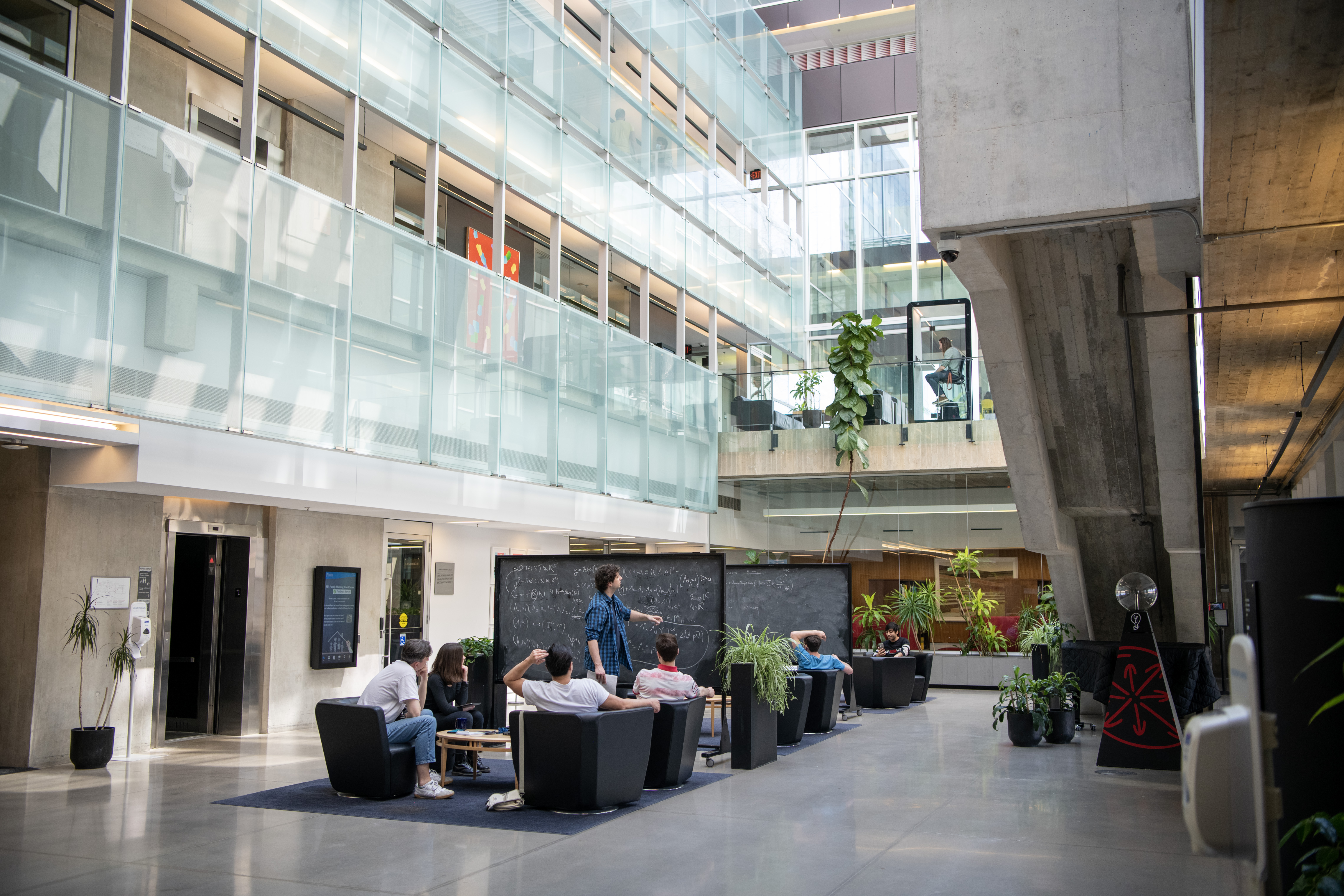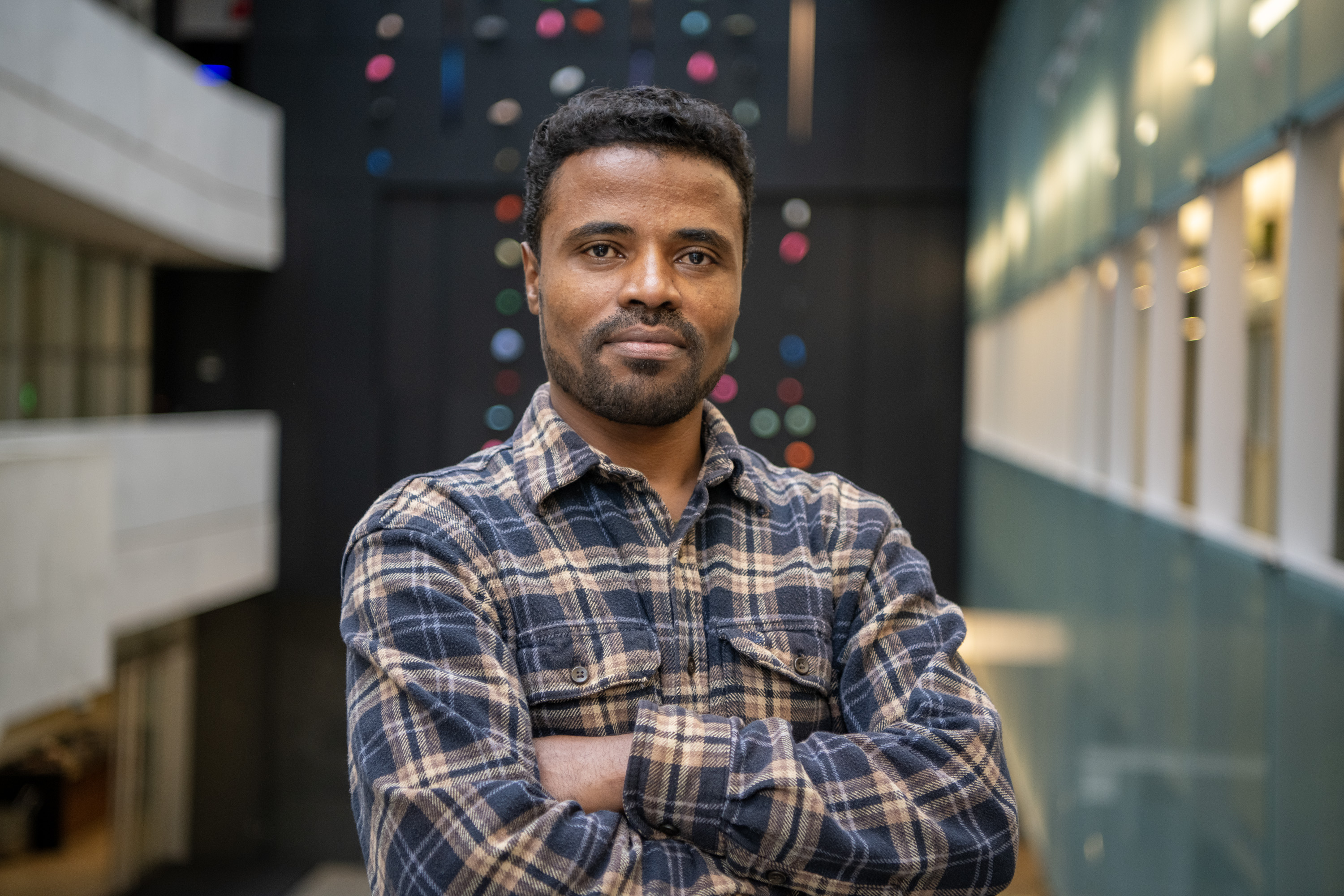On Anteneh Getachew Gebrie’s first day at Perimeter Institute, the first thing he noticed was the number of blackboards. There were blackboards in the usual places — the classrooms and presentation halls — but as he made his way through the building, he found every hallway, common area, and out-of-the-way nook lined with chalky blackboards or Expo-marked glass walls. Equations were scrawled on every surface, attempting to describe everything from the underlying logic of quantum mechanics to the chaos of imploding stars.
“When I first came, I was stopping at every wall where somebody wrote something,” Gebrie said. “Some I can understand; some I cannot. But I would stop and stare and, at least, I would appreciate the handwriting.”
At Perimeter, researchers are staring down big questions on the frontiers of theoretical physics. Here, breakthroughs emerge from collaborations with colleagues, which usually start by writing an idea on the wall.
A desire for collaboration is what motivated Gebrie to apply for the 2024 Africa Fellowship, a partnership between Perimeter, the Fields Institute, and the African Institute for Mathematical Sciences (AIMS) that supports the careers of young researchers committed to advancing science in Africa. Each year, the program creates two postdoctoral fellowships, one at Perimeter and one at the Fields Institute, for citizens of an African country to study and conduct research.
A mathematician from Ethiopia, Gebrie studies analysis and optimization theory. Analysis is a fundamental tool in mathematics that deals with functions, spaces, and operators. Mathematical optimization, on the other hand, examines maximizing or minimizing complex, high-dimensional problems by finding the best available values across a set of inputs.
“For example,” Gebrie explained, “if a contractor wants to build a bridge, they will want to increase the bridge’s strength and decrease the expense of creating the bridge. Here you have two objective functions: one to be minimized and the second to be maximized. This type of optimization problem — which tries to achieve multiple goals — is called multi-objective optimization.”
As the contractor considers the cost and integrity of hundreds of materials, as well as other factors like schedule, storage, and staffing, more variables are introduced, and the problem becomes more complex. Optimization theory seeks to find the best solution of all possible choices.
But you won’t find Gebrie near a construction site. “My research is pure mathematics: theorem, proof, theorem, proof. A paper and pen type of work.” Though Gebrie is not directly involved in the real-world applications of optimization theory, his work will ultimately contribute to advancements in areas like machine learning.
Gebrie was drawn to the fellowship for the chance to collaborate with theorists who share his interest in pressing, unresolved questions within optimization theory. At Perimeter, he has been working alongside Levent Tunçel and Walaa Moursi, professors at the University of Waterloo, to tackle a particularly challenging question.
“We’re looking at an open problem that is not well explored,” Gebrie said. “We’re examining what is known as the ‘Douglas-Rachford method for inconsistent feasibility problems,’ and asking, ‘What is the nature and the analysis of this method, when the problem has no solution?’ To me, it’s very amazing.”
As his fellowship concludes this fall, and with work still to be done on the unsolved problem, Gebrie has been invited to continue his research with Tunçel and Moursi as a postdoc at the University of Waterloo.
To Gebrie, the Fields-AIMS-Perimeter Africa Fellowship was an opportunity to build valuable connections and research experiences. His research has culminated in two forthcoming papers, one that has been submitted for journal publication and another that is nearing completion, and he believes that these publications, linked to a prestigious institute like Perimeter, have a “huge impact on my research, knowledge, and overall experience.”
By partnering with AIMS, a pan-African network of centres for postgraduate training and research, the fellowship empowers each fellow to mentor and inspire the next generation of African scholars.
Gebrie spent two months at the AIMS Centre in Limbe, Cameroon, where he supervised a student and mentored a group of seven undergraduate students pursuing degrees in mathematics. “It was a great experience to advise students, to talk to students about my experience, to share how to write a thesis, and to just give them mentorship and hear their questions,” Gebrie said.
Mathematics has taken Gebrie around the globe, with a doctorate from Naresuan University in Thailand and fellowships at Kyoto University in Japan, the University of Konstanz in Germany, and the Polytechnic Institute of Paris (ENSTA) in France. Having travelled and studied across the map, Gebrie is eager to return to Ethiopia and contribute to meaningful change in an education system that he feels doesn’t adequately support academics.
“I'm born in Ethiopia, raised in Ethiopia, and studied up to the level of master's in Ethiopia,” Gebrie said. “All my experience, education, and background are from Ethiopia. I wish to go back and serve my country, to change the education system. That’s truly my interest. That's my plan.”
About the Fields-AIMS-Perimeter Africa Fellowship
Created in 2013, the Fields/AIMS/Perimeter Africa Fellowship initially hosted one fellow each year, with Perimeter and Fields alternating as host. In 2022, the program was amended, making space for each institute to hire and host a fellow each year. Each year, fellows visit one of AIMS’ Centres across Africa, in Rwanda, Senegal, Ghana, South Africa, and Cameroon. Since its creation, the Africa Fellowship has supported nearly a dozen fellows from eight countries across the African continent.
À propos de l’IP
L'Institut Périmètre est le plus grand centre de recherche en physique théorique au monde. Fondé en 1999, cet institut indépendant vise à favoriser les percées dans la compréhension fondamentale de notre univers, des plus infimes particules au cosmos tout entier. Les recherches effectuées à l’Institut Périmètre reposent sur l'idée que la science fondamentale fait progresser le savoir humain et catalyse l'innovation, et que la physique théorique d'aujourd'hui est la technologie de demain. Situé dans la région de Waterloo, cet établissement sans but lucratif met de l'avant un partenariat public-privé unique en son genre avec entre autres les gouvernements de l'Ontario et du Canada. Il facilite la recherche de pointe, forme la prochaine génération de pionniers de la science et communique le pouvoir de la physique grâce à des programmes primés d'éducation et de vulgarisation.


